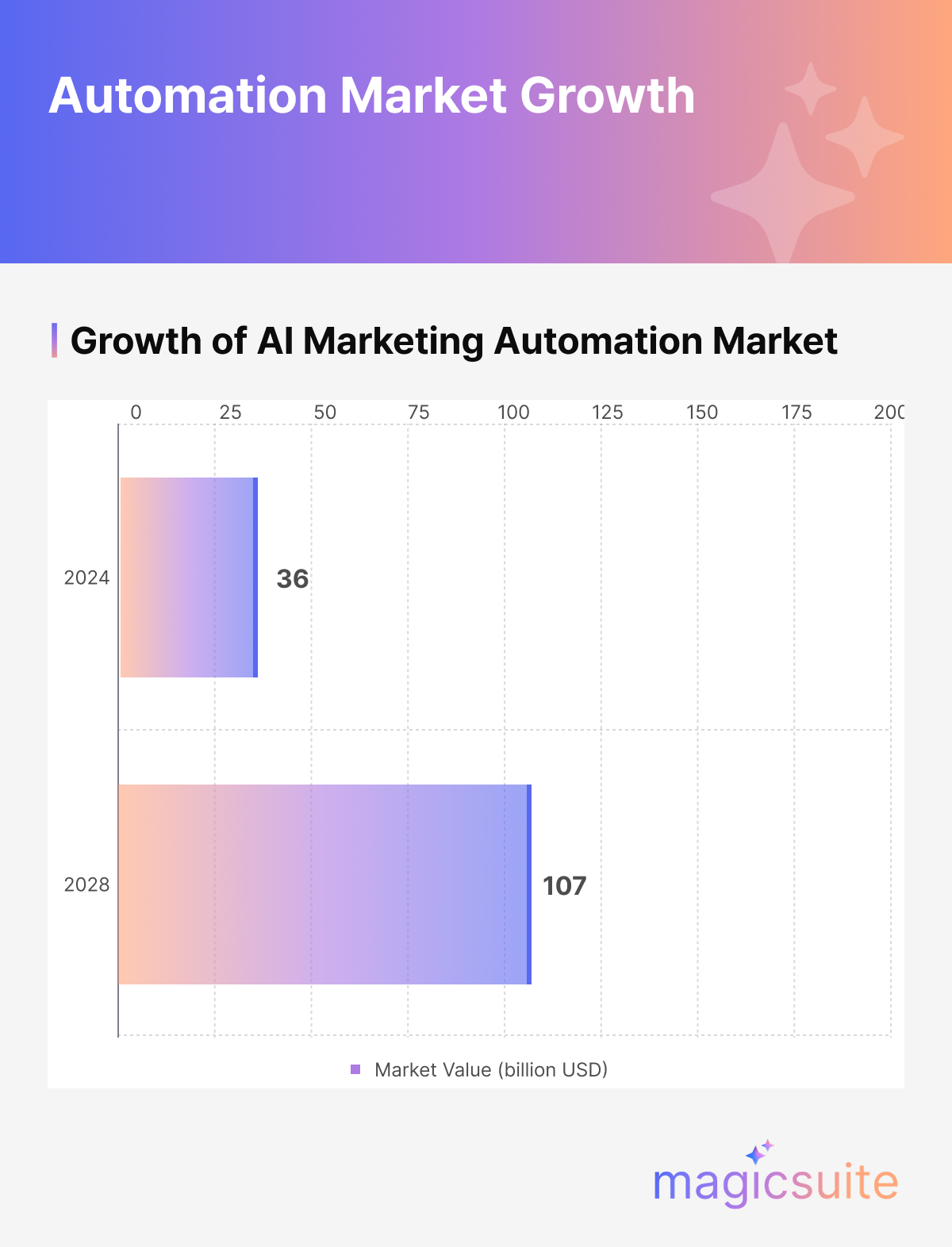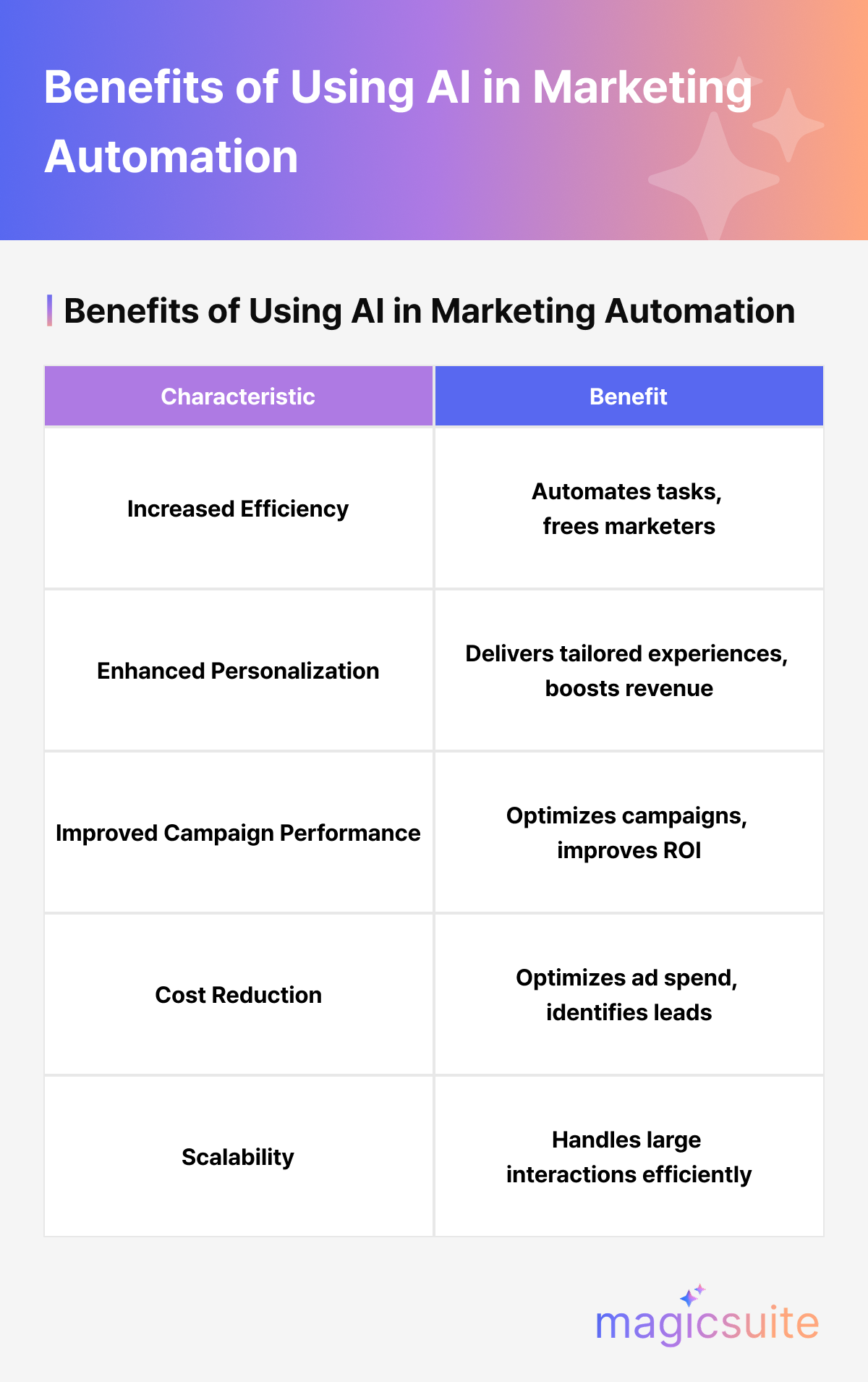Learn how AI streamlines tasks, personalizes customer experiences, and boosts campaign ROI. Explore market trends, key features like predictive analytics, and real-world case studies. Discover the future of AI in marketing!

AI marketing automation is changing how businesses engage with customers by merging artificial intelligence with marketing processes. This powerful combination streamlines tasks, personalizes experiences, and optimizes campaign performance.
With AI marketing automation, companies can deliver highly targeted messages at scale, enhance efficiency, and make data-driven decisions that significantly boost revenue and customer satisfaction.
AI marketing automation combines traditional marketing automation, such as email marketing, social media scheduling, and lead nurturing, with AI capabilities that allow systems to learn from data and make intelligent decisions.
This integration enables businesses to automate time-consuming tasks, analyze large datasets quickly, and deliver personalized customer experiences at scale.

The AI marketing automation market is rapidly expanding, with estimates projecting a value of nearly $36 billion in 2024 and potentially exceeding $107 billion by 2028. Adoption is widespread, with over 60% of marketers already leveraging AI in their campaigns, and many more planning to do so to stay competitive.
AI analyzes vast amounts of data from diverse sources to identify patterns and forecast customer behavior. This capability allows marketers to segment their audiences with incredible precision and predict trends, enabling proactive campaigns and resource allocation adjustments.
Harnessing AI-driven tools, marketers can tailor messages, product recommendations, and email campaigns to individual preferences. Hyper-personalization in marketing enhances engagement and conversion rates by delivering relevant content at the right time. For example, platforms like Netflix and Amazon utilize AI to suggest content based on user behavior.
AI chatbots automate customer interactions, providing instant responses while gathering valuable conversation insights. These tools improve customer service efficiency and help marketers refine customer journeys and content strategies based on real-time feedback.
Check out: Best AI Chatbot for E-commerce: Top 5 Tools

Here are some of the benefits of using AI in marketing automation:
Automating repetitive tasks such as email campaigns, social media posting, and data entry frees marketers to focus on strategy and creativity. This can reduce operational costs, allowing teams to allocate resources more effectively.
AI utilizes customer data to deliver tailored experiences that increase satisfaction and loyalty. Research shows that personalized content can boost revenue by 10-15%, demonstrating the financial impact of practical personalization efforts.
With real-time data analysis and predictive insights, marketers can dynamically optimize campaigns, improving return on investment (ROI) and competitive positioning. This continuous optimization ensures that marketing strategies remain relevant and effective.
AI marketing automation helps optimize ad spend by identifying high-value leads and eliminating wasted marketing efforts. This data-driven approach ensures that every dollar spent contributes to meaningful results.
AI systems can handle large customer interactions without requiring proportional increases in human resources. This scalability makes AI marketing automation ideal for growing businesses that need to manage increased customer engagement efficiently.
Here are some of the specific applications of AI marketing automation especially in the field of hyper-personalization and operational efficiency.
AI-driven tools like Movable Ink modify email content after delivery based on real-time user behavior. A retail brand might initially send a generic promotional email, but the embedded AI updates product recommendations if the recipient later browses specific categories on the company’s website. This post-send personalization lifts open rates by 20–30% in some deployments.
Systems detect micro-moments—such as cart abandonment or prolonged product page views—to initiate tailored workflows. Sephora’s Virtual Artist app combines computer vision and AI to recommend makeup shades via augmented reality (AR), reducing return rates by 15% through accurate color matching. Similarly, Amazon’s recommendation engine drives 35% of total sales by suggesting complementary items based on browsing history.
AI marketing platforms like Optimove autonomously manage multichannel campaigns, determining optimal send times, channels, and frequencies for each customer. Seventh Sense’s email optimization tool increased HubSpot users’ open rates by 27% by predicting individualized send times aligned with recipients’ activity patterns.
Zapier’s AI Copilot enables non-technical teams to build automated workflows between apps like Salesforce, Slack, and Google Sheets. A marketer might create a Zap that triggers a welcome email when a new lead enters the CRM, then logs the interaction in a spreadsheet—all through natural language prompts.
Several AI-powered platforms assist marketers in various aspects of their campaigns:
Read more on: 7 Best Marketing Automation Tools for Startups.
Employing a clear cost-benefit analysis framework and learning from successful case studies, businesses can make informed decisions about how to integrate integrate AI into their marketing strategy.
To measure the return on investment (ROI) for marketing automation, we use the following formula:
ROI = (Net Profit - Total Costs) / Total Costs × 100
In this equation, Total Costs encompass software licenses, implementation fees, and training expenses. Net Profit is derived from the incremental revenue generated by automated campaigns. This straightforward calculation enables companies to assess the financial impact of their marketing automation efforts effectively.
BMW successfully implemented an AI model to prioritize sales leads based on demographic and behavioral data. By directing their resources toward high-probability prospects, BMW managed to reduce their cost per lead by 22% and boost test drive bookings by 17%.
The annual licensing cost of the AI system was $150,000, which resulted in $2.3 million in additional revenue, translating to an impressive ROI of 1,433%. This case shows how targeted automation can significantly enhance marketing effectiveness and drive revenue growth.
Most organizations typically recoup their investments in automation within 12 to 18 months. For instance, a SaaS company spending $60,000 annually on ActiveCampaign could reach break-even by automating 10 hours a week of manual email management, valued at $40 per hour, while also increasing conversion rates by 2%. This illustrates how automation not only streamlines processes but also contributes to financial gains.
Tools like Sora convert text prompts into high-quality videos, enabling rapid production of localized ads. A travel agency could generate 30 regional variations of a vacation promo video in under an hour, each featuring landmarks and language specific to the target market.
Advanced ML models now forecast CLV with 90% accuracy by incorporating macroeconomic indicators, competitive activity, and brand sentiment trends. This allows precise budget allocation—e.g., increasing retention spend for high-CLV segments during recessions.
Self-improving AI systems like Albert.ai make 1,000+ bid adjustments per minute across Google, Meta, and TikTok ads. In a recent trial, such platforms reduced CPA by 40% while maintaining volume by continuously testing creatives and audience combinations
AI marketing automation represents a transformative shift in how businesses engage with customers and optimize marketing efforts. Automating routine tasks, personalizing interactions at scale, and leveraging predictive insights empower marketers to deliver more effective, efficient, and customer-centric campaigns.
Embracing AI marketing automation is not just a trend—it's necessary for businesses aiming to thrive in today's competitive environment.
Follow MagicSuite.ai for more guides and latest trends on AI and marketing!

Ace is the product manager of MagicSuite and multiple other projects at Makebot AI. With extensive experience in product development and leadership, Ace ensures that each project aligns with market needs and delivers innovative solutions. Passionate about technology and automation, Ace plays a crucial role in shaping AI-driven products that enhance efficiency and user experience.